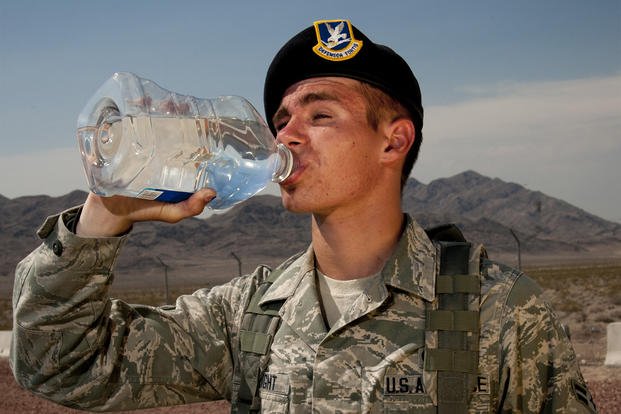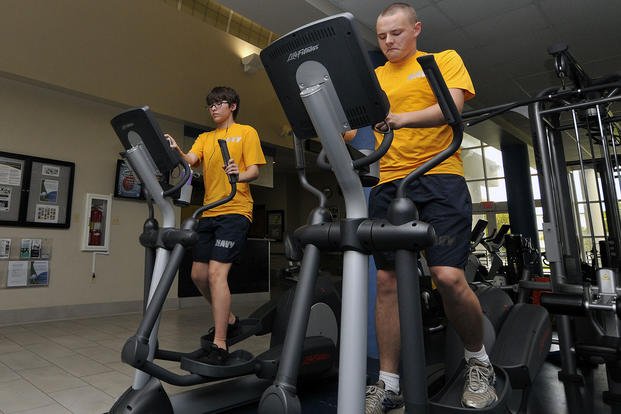Many start with a desire to serve, but they get sidetracked once they discover there is a height/weight and/or body-fat standard to get into the military. Just this obstacle alone often will deter people from moving forward with their goal of serving this country.
Recent reports show that the number one reason why 18- to 22-year-olds who want to join fail to get accepted is not because of medical issues, high school education or criminal history. It is because they failed the height, weight and body-fat standards. This is a sad reality in today's America, but it is completely preventable.
Here is a very typical email received this week concerning that demographic that wants to serve:
Mr. Smith -- first off, I want to thank you for providing free and helpful fitness advice for future military hopefuls. I'm a 20-year-old male going into my senior year of college. I'm 5'11" and 245 pounds. I obviously don't meet standards for the military, but I would really like to try for OCS after I graduate. My main problem is being able to commit to and be consistent with a diet and exercise plan. Do you have any suggestions that would help me stick to them, so that I'd be ready by this time next year? Thank you very much, Daniel
Daniel, you are very smart to give yourself a year, because that is typically what it takes to lose weight and get prepared physically enough so that you will not sustain overtraining injuries associated with a two-mile platoon run. There is good news and real news (not bad news if your attitude is right):
First, the good news: You are young. Typically, a young person making minor changes to their diet and activity level will produce results in a relatively short time. Also, at your height and weight, you should lose your first 20-25 pounds pretty quickly, which will enable you to run farther and faster, thus producing additional calorie expenditure to lose more weight.

Also, simply drinking more water than you (likely) do now will help with quick weight loss, too. At your weight, try adding a gallon of water a day while dropping sodas. The results will come quickly.
Now for the bad news: This takes discipline. Initially, you likely will get by on your first few weeks of a workout program on motivation, but might fail to do a workout "when you do not feel like it." This is when you must train. This is how mental toughness, personal confidence and good habits are built. You will always feel better after a workout than if you skip a workout.
Get out of the skipping habit and into the doing habit. Breaking habits are just as tough as building new ones, but it's completely doable in as little as your first month with consistent training. If you are not running now and don't have a foundation in running, I would recommend starting your cardio-based training on non-impact options like biking, elliptical machines, rowing machines or swimming. See ideas for workouts. Once you drop at least 20-25 pounds, we can add running programs to the routine.
The real news: It is difficult to outwork a crappy diet. Eat natural foods, such as fruits and vegetables, for energy. Eat lean meats (fish, chicken, beef) and avoid too many processed sugars (sweets, breads, pastas) for daily consumption. See some ideas with the Lean Down Plan. Drink more water and avoid sugary drinks (juices, sodas, alcohol), as the extra calories from just these alone can ruin a 1,000-calorie burn workout quickly. No need to starve yourself, but eat smaller servings and never walk away from the dinner table so full that you want to take a nap. Eat for energy to train the next day.
Here is a great plan to get started: Beginner Fitness Routine -- Weight Loss/Fitness Focus
Once you figure out what branch of service you want to start preparing for, check out the Military/Police Fitness Training Pipeline for ideas regarding specific steps to your fitness test and future training.
Stew Smith is a former Navy SEAL and fitness author certified as a Strength and Conditioning Specialist (CSCS) with the National Strength and Conditioning Association. Visit his Fitness eBook store if you're looking to start a workout program to create a healthy lifestyle. Send your fitness questions to stew@stewsmith.com.
Want to Learn More About Military Life?
Whether you're thinking of joining the military, looking for fitness and basic training tips, or keeping up with military life and benefits, Military.com has you covered. Subscribe to Military.com to have military news, updates and resources delivered directly to your inbox.


















